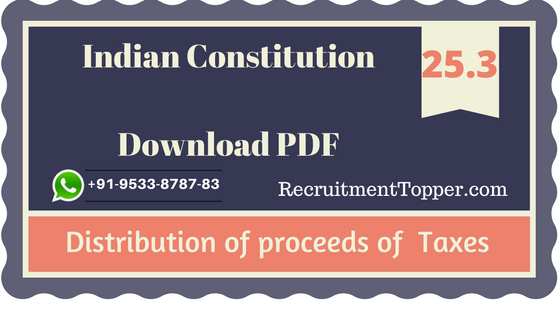Distribution of proceeds of Taxes | Indian Constitution Download PDF
Contents
Even though a Legislature may have been given the power to levy affinity to the subject-matter of proceeds of Taxes. taxation, the yield of different taxes coming within the State legislative sphere may not be large enough to serve the purposes of a State. To meet this situation, the Constitution makes special provisions:
(i) Some duties are leviable by the Union; but they are to be collected and entirely appropriated by the States after collection.
(ii) There are some taxes which are both levied and collected by the Union, but the proceeds are then assigned by the Union to those States within which they have been levied.
(iii) Again, there are taxes which are levied and collected by the Union but the proceeds are distributed between the Union and the State.
The distribution of the tax-revenue between the Union and the States, according to the foregoing principles, stands as follows:
(A) Taxes belonging to the Union exclusively:
1. Customs. 2. Corporation tax. 3. Taxes on capital value of assets of individuals and Companies. 4. Surcharge on income tax, etc. 5. Fees in respect of matters in the Union List (List I).
(B) Taxes belonging to the States exclusively:
1. Land Revenue. 2. Stamp duty except in documents included in the Union List. 3. Succession duty, Estate duty, and Income tax on agricultural land. 4. Taxes on passengers and goods carried on inland waterways. 5. Taxes on lands and buildings, mineral rights. 6. Taxes on animals and boats, on road vehicles, on advertisements, on consumption of electricity, on luxuries and amusements, etc. 7. Taxes on entry of goods into local areas. 8. Sales Tax. 9. Tolls. 10. Fees in respect of matters in the State List. 11. Taxes on professions, trades, etc., not exceeding Rs. 2,500 per annum (List II).
(C) Duties Levied by the Union but Collected and Appropriated by the States:
Stamp duties on bills of Exchange, etc., and Excise duties on medicinal and toilet preparations containing alcohol, though they are included in the Union list and levied by the Union, shall be collected by the States insofar as leviable within their respective territories, and shall form part of the States by whom they are collected [Art. 268].
(D) Taxes Levied as well as Collected by the Union, but Assigned to the States within which they are Leviable:
(a) Duties on succession to property other than agricultural land, (b) Estate duty in respect of property other than agricultural land, (c) Terminal taxes on goods or passengers carried by railway, air or sea. (d) Taxes on railway fares and freights, (e) Taxes on stock exchange other than stamp duties, (f) Taxes on sales of and advertisements in newspapers, (g) Taxes on the sale or purchase of goods other than newspapers, where such sale or purchase takes place in the course of inter-State trade or commerce, (h) Taxes on inter-State consignment of goods [Art. 269].
(E) Taxes Levied and Collected by the Union and Distributed between Union and the States:
Certain taxes shall be levied as well as collected by the Union, but their proceeds shall be divided between the Union and the States in a certain proportion, in order to effect an equitable division of the financial resources. These are—
(a) Taxes on income other than on agricultural income [Art. 270].
(b) Duties of excise as are included in the Union List, excepting medicinal and toilet preparations may also be distributed, if Parliament by law so provides [Art. 272].
(F) The principal sources of non-tax revenues of the Union are the receipts from—
Railways; Posts and Telegraphs; Broadcasting; Opium; Currency and Mint; Industrial and Commercial Undertakings of the Central, Government relating to the subjects over which the Union has jurisdiction.
Of the Industrial and Commercial Undertakings relating to Central subjects may be mentioned—
The Industrial Finance Corporation; Air India; Indian Airlines; Industries in which the Government of India have made investments, such as the Steel Authority of India; the Hindustan Shipyard Ltd; the Indian Telephone Industries Ltd.
(G) The States, similarly, have their receipts from—
Forests, Irrigation and Commercial Enterprises (like Electricity, Road Transport) and Industrial Undertakings (such as Soap, Sandalwood, Iron and Steel in Karnataka, Paper in Madhya Pradesh, Milk Supply in Mumbai, Deep-sea Fishing and Silk in West Bengal).
Grants in Aid
Even after the assignment to the States of a share of the Central taxes, the resources of all the States may not be adequate enough. The Constitution, therefore, provides that grants-in-aid shall be made in each year by the Union to such States as Parliament may determine to be in need of assistance; particularly, for the promotion of welfare of tribal areas, including special grants to Assam in this respect [Art. 275].

Leave a Reply